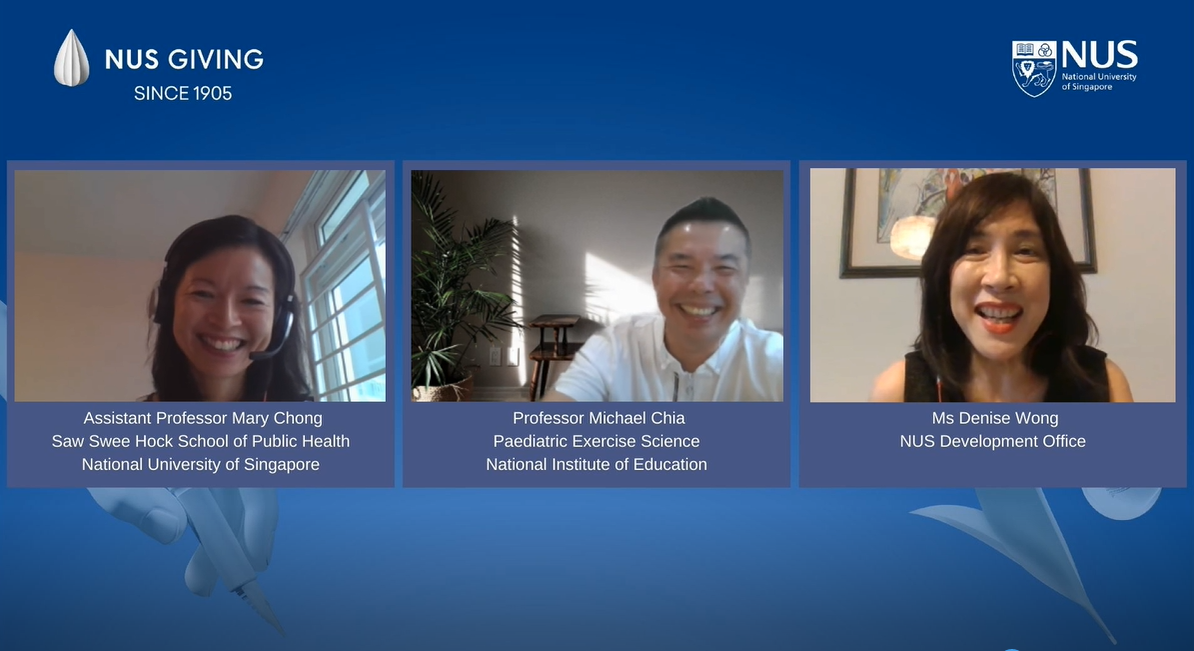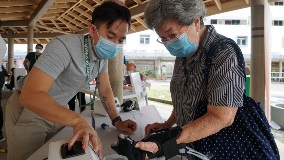Speakers at an NUS Giving Experience Webinar session shared key insights on establishing the right lifestyle habits from a young age.
What does it take to raise a child to loves his greens? The answer is simple — be a good role model.
Parents should start by reflecting on their own eating habits. A local study has shown that when a parent snacks, the child is likely to follow suit. If a parent enjoys vegetables, the child is also likely to adopt the same food preferences.

From left: Assistant Professor Mary Chong and Professor Michael Chia adding a splash of realism as they field questions from participants
What does it take to raise a child to loves his greens? The answer is simple — be a good role model.
Parents should start by reflecting on their own eating habits. A local study has shown that when a parent snacks, the child is likely to follow suit. If a parent enjoys vegetables, the child is also likely to adopt the same food preferences.
“Role modelling by parents is important. Like the adage ‘monkey see monkey do’, when children see people around them eating fruits and vegetables, they will want to follow suit,” said Assistant Professor Mary Chong from the National University of Singapore (NUS) Saw Swee Hock School of Public Health.
Professor Chong was sharing her research at an NUS Giving Experience Webinar session, titled Eating Healthy and Growing Resilient in the Digital Age. Together with Paediatric Exercise Science Professor Michael Chia from the National Institute of Education, the webinar provided on key insights on establishing the right lifestyle habits from a young age.
Both experts shared worrying trends as they studied the lifestyle habits of children in Singapore. They found that children are consuming too much sweetened beverages. On top of that, children are constantly glued to devices as they prefer screen time over exercise, and almost everything else.
Professor Chia shared that one of the aims of his research is to transform our environment from obesogenic to energetic.
An obesogenic environment is one where people lead a sedentary lifestyle which in turn causes weight gain. People also tend to make poor food choices and have poor sleeping habits. Conversely, an energetic environment encourages outdoor play, healthy eating, limited screen time and good sleeping habits.
An energetic environment on the other hand, is one where parent or caregiver, and children have sufficient outdoor play, quality sedentary time, a nutritious diet, adequate good quality sleep, and healthy family and social relationships with others.
Professor Chia shared three ideas for parents and caregivers to create a conducive energetic environment.
He said: “First, create digital desserts at home. That means engaging in physical activities that do not involve any digital devices. Secondly, use technology in creative and meaningful ways for learning and other activities. Thirdly, ensure that screen time does not replace time for sleep, physical activity, especially playing outdoors, meals, and interacting with significant others.”
Professor Chia opines that as children grow up in no time at all, he asks “What sorts of memories do you wish to create with your children”. Energetic ones tend to be more enduring than obesogenic ones, he offers.
“It is best to start cultivating good habits in children as early as possible.as habits from young often track to adulthood” added Professor Chong.
However, if you have missed the boat, do not fret. While old habits die hard, it is not too late to change.
“What we are learning is that at every stage of life, be it adolescents, young working adults, elderly, everybody still needs to be continuously educated or be reminded about healthy eating. So, it isn’t about starting (good habits) early and then forgetting about them for the rest of your life,” Professor Chong shared.
“From our work with the elderly, we observed that it is not too late for seniors in their 50s and 60s to change their eating habits. This is because even changing habits at this age can help to mitigate their risk of chronic diseases much later in the elderly stage. The key message here is that it's never too late to adopt a healthy lifestyle and reap its’ benefits,” she concluded.






